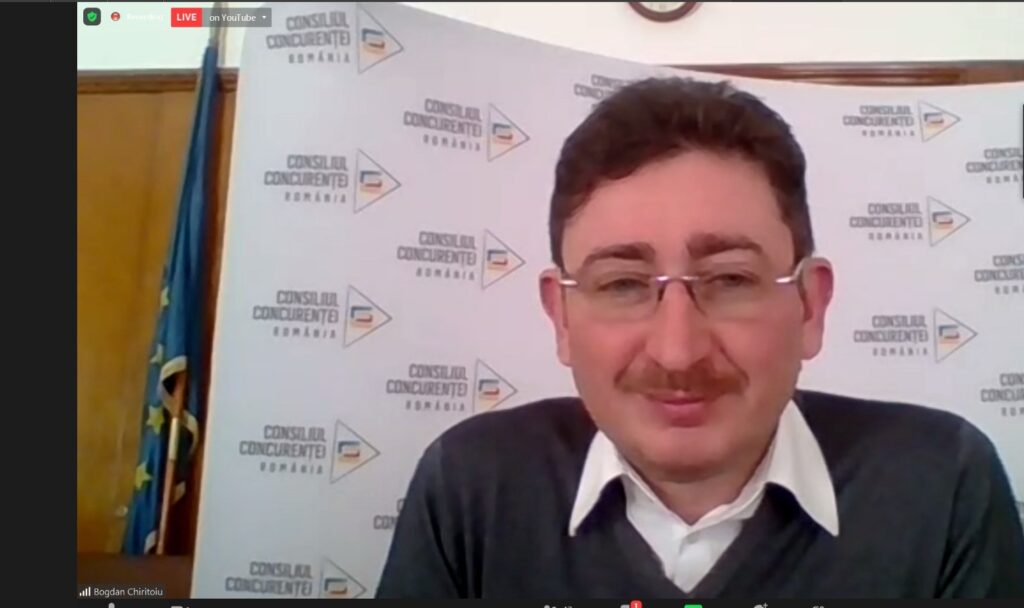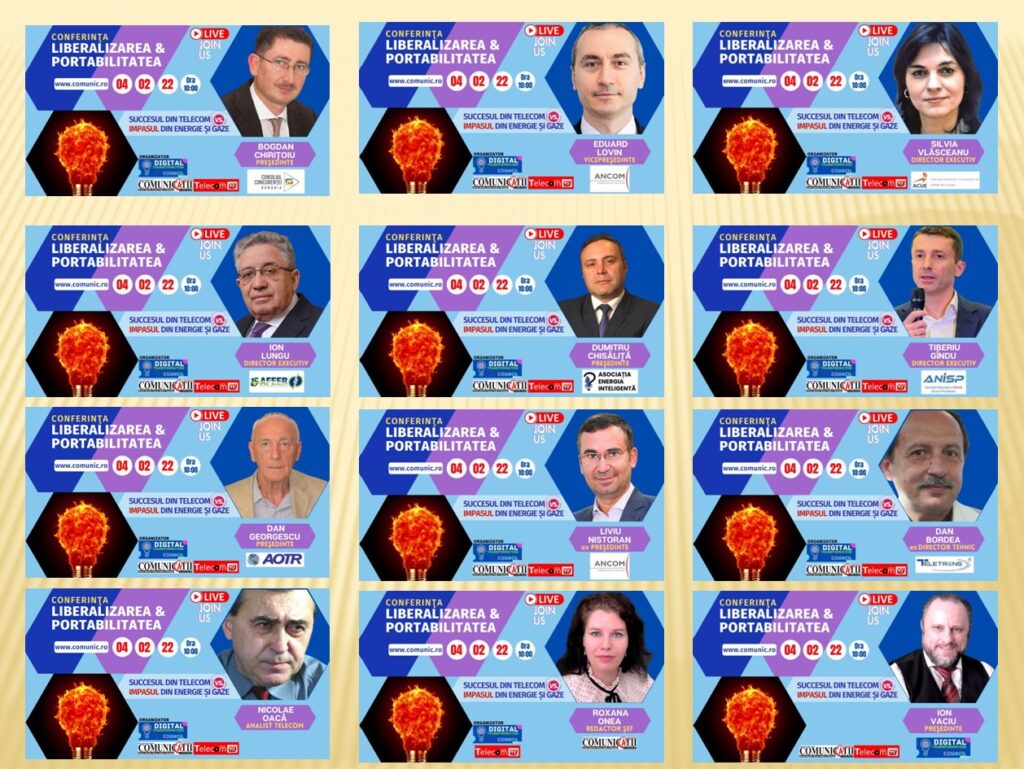This post is also available in:
![]() Română
Română
Bogdan CHIRIȚOIU – CHAIRMAN OF THE COMPETITION COUNCIL @ Conference LIBERALIZATION & PORTABILITY – SUCCESS IN TELECOM vs. THE IMPASS FROM ENERGY AND GASES , organized by Digital Transformation Council, Revista COMUNICAȚII Mobile and TelecomTV.ro on February 4, 2022.
What is currently happening in energy is not so much the fault of the authorities and, yes, it is clear that things could have been done better and we can learn from ANCOM’s actions.
The communications market, unlike the energy market, is a national one, where you can do things differently than in the rest of Europe.
As a national market, we must also take into account the fact that we are poorer than others in Europe, and suppliers can take into account the fact that they have lower-income customers than in other countries.

There are certain factors that allow you to have a different market than what happens in Western Europe. In terms of energy, things are not the same. We have a global or European energy market, it is not a market in which Romania can have autonomy, in which it can have other prices than the rest of Europe.
A few years ago, Romania’s energy market was a national one, we didn’t have as many gas pipelines or electric cables.
Currently, we are very interconnected with the rest of Europe and I don’t see how we could have other prices in Romania than in Europe.
Gas and electricity are not like oil, but they are starting to be, at least from the perspective that you no longer have your national market. Take a look at oil, which before the pandemic was at $ 60 a barrel, then dropped to $ 20 a barrel, and now, on the back of the economic recovery, it has risen to over $ 90 a barrel.
Oil has gigantic fluctuations, the price of oil has risen several times in a short time.
Romania is a small market, we accept these prices, we cannot influence the price of the barrel, we buy it at the quoted prices.
This is currently happening on both electricity and gas.
We are a part of the European economy and as it goes, so do our prices.
Normally, we do not have such large fluctuations in electricity and natural gas, but we have a special context, related to the fact that, for the first time in history, Russia uses strategically the fact that it is Europe’s main gas supplier.
This situation has existed for many years, at least since the 1980s.
Gas pipelines between Russia and Germany were built in the Cold War, at a time when these countries were at a certain risk of going to war, and yet pipelines were built and worked well. .

Russia’s message has always been that I am a reliable partner and that, regardless of political tensions, business is business and will not be affected.
Unfortunately, this time Putin has decided not to follow this tradition.
Russia honors its long-term bilateral contracts at the prices set out in those contracts, but no longer delivers on spot markets.
Without deliveries to spot markets, gas prices on the European market have risen sharply.
The price in the market is given by the most expensive resource, which, traditionally, is coal. At present, exceptionally, the cost of energy from gas is more expensive than the cost of energy from coal.
The increase in gas prices, because Russia no longer delivers on spot markets, has also led to an increase in the price of electricity.
This exceptional situation on the gas side will probably end in a few months, the price of gas will come closer to the level before the beginning of the pandemic. Thus, there will probably be a decrease in the price of electricity as well.
We must remember that we are dependent on the rest of Europe, which is a good thing, because when we have too expensive electricity we can bring it from Western Europe. On the other hand, Romania cannot be detached from the rest of the European states, we cannot become an energy island again, let us live only from our resources. We can’t, because we can’t politically.
We will not get rid of our dependence on Russia quickly, but I think this crisis opens our eyes to the fact that it is not healthy to depend so much on Russia, a complicated country. Russia is not Switzerland, Russia is a complicated country with diverse interests, which has now decided to use energy levers for various political purposes. I believe that Russia, by its behavior, will force the EU not to depend so much on it and will act in the direction of diversifying energy sources, but we cannot do this from today to tomorrow.
A myth we live in is our problem that we do not meet our energy needs, that we exported electricity a few years ago and now we import. For gas, we imported 10%, now we have imported 20%. Well, it’s very good that you produce and export, because you make money, but prices have nothing to do with it. Whether you are an importer or an exporter, electricity and gas prices will be the same in Europe. When they are small in Europe, they will be small in our country, when they are big in Europe, they will be big in our country.
That means being part of an internal market.
The subject of national gas and electricity production is an important one and it would be good to produce more of both and export because that way we will make money.
In conclusion, energy is not like communications, because from an economic point of view they are different in nature. The current rise in prices has nothing to do with the liberalization of the electricity market. Human memory forgets the good parts and goes to the bad things. Nobody remembers that, after the liberalization of the gas price, the bills decreased. But why did they fall? Because it was the time of the pandemic, the world economy contracted and the price of gas fell. In the winter of 2020-2021, the personal gas bill fell by 30%. Now, I’m also looking forward to the next bill.
Liberalization helps the market to do better, but when prices fall in Europe, they also fall in Romania, and when they rise, they rise in our country as well.
Electricity prices were abnormally low because the state forced state-owned companies to sell energy below market price. When liberalization took place, when it moved to a market price, prices went up, as opposed to gas prices, which went down because of the pandemic.
I have no sign that electricity prices have risen unjustifiably for a long time, they have gone to the market price, which has meant that state-owned companies have not sold at a loss. Here is a dose of hypocrisy, we keep complaining that we do not have enough domestic production, but on the other hand, if these companies sell below market price, where to get Hidroelectrica, in particular, and Nuclearelectrica, funds for investment, for development of new production capacities.
We want state-owned companies to be unprofitable, why should they be profitable if they are state-owned, but at the same time we want them to have investment funds when they sell below market price.
I believe that examples of good practice in the telecommunications market, such as portability, can be successfully applied, with the same results in the energy and gas markets.
Wide fluctuations in energy prices are disturbing for the population, which has never faced such situations, and I believe that steps will be taken in the future to prevent such large price movements from taking place. At present, this fluctuation exists and we must defend the population, especially the vulnerable.
The problem of energy prices is more pronounced in the countries of Eastern and Southern Europe. In richer countries, such as Germany, there is not much discussion about the price of energy. In their consumer basket, even if the price has risen, energy is not so important.
Romania does not have higher prices than in the rest of Europe, the price of electricity is about the same throughout Europe. The problem is that in Romania, compared to other states, the price of energy is dictated by the stock market. In other countries, prices are those in contracts, which are concluded on a long-term basis. Indeed, we have a problem here. In Romania, the price of energy is set on the stock exchange, but through spot contracts, not longer-term contracts.
We have a lot of spot, most of the electricity is traded on spot contracts, which are volatile. Here was the mistake and here we have to correct. The spot market is good, but we have become very dependent on it, which is not normal. Half of the amount of electricity in Romania is traded on the spot market.
I expect the price of gas and electricity to fall from April.
Unfortunately, energy operators have a monopoly mentality and, drawing a parallel with the telecom market, are a kind of Romtelecom before the 1998 privatization. Now look at telecom operators. They are flexible, attentive to market requirements, react immediately. Energy operators are heavy, the number of employees in the call center has not increased, they are constantly overwhelmed and surprised, they do not cope with the requests to expand the network, similar to Romtelecom in the ’90s.
It is clear that these operators have a problem of culture, adaptation to the idea of the market and flexibility.
Wrong invoices will be corrected, we received assurances from suppliers.
It is clear to me that the recent high energy and gas prices are not due to a conspiracy by suppliers against consumers. High prices are the result of Russia’s decision not to supply gas on demand, and in this context the price of energy has also risen. It is no mystery, no conspiracy.
















